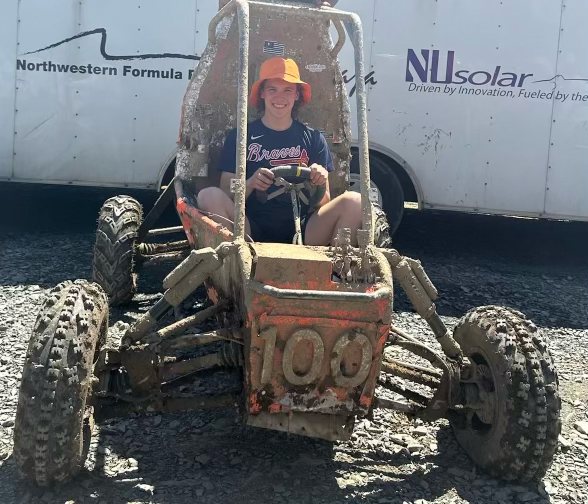Grad Spotlight: Turner Davidson Turns Passion for Automotive Design into Hands-On Engineering Success
Davidson is graduating with a degree in mechanical engineering
During his time at Northwestern Engineering, Turner Davidson spent countless hours in the workshop inside the Ford Engineering Design Center. Not only was Davidson there to build cars as part of Northwestern’s Baja SAE racing team, he also constructed parts for his personal project: restoring Isuzu sport utility vehicles. From fabricating a custom supercharger system to designing a spare wheel carrier, the shop became a second home and a key part of Davidson’s experience in Evanston.

“While I chose to do these projects for fun, I would certainly consider them an integral part of my Northwestern education,” Davidson said.
Graduating from the McCormick School of Engineering with a degree in mechanical engineering (ME), Davidson will work for Yamaha Motor Manufacturing Corporation as a vehicle design engineer. Davidson, who served as the Baja team’s chief engineer, will design new components for all-terrain vehicles and utility task vehicles, ranging from ergonomic luxuries to off-road suspension assemblies.
In a Q&A, Davidson reflected on his time at Northwestern Engineering.
Why did you decide to pursue engineering at Northwestern?
I chose to pursue engineering at Northwestern because of the opportunities available to me. I knew when I was applying to schools that I wanted to participate in Baja SAE, and I wanted to develop my shop skills. I also learned students were able to use the Ford shop for personal projects once they were trained, which was very appealing to me. I was excited about the ME concentration program because it would allow me to specialize in an area of interest as a part of my major's curriculum.
How did the McCormick curriculum help build a balanced, whole-brain ecosystem around your studies in your major? Any course highlights you'd like to share?
I thoroughly enjoyed Design Thinking and Communication (DTC) because it provided a solid foundation for how to design a solution to an engineering problem. I found the practical applications and experiences to be quite valuable, and DTC convinced me that engineering was the correct fit for me. It was rewarding to build multiple functional prototypes in my first year at Northwestern.
One course highlight was Professor Michael Beltran's class, Computer Integrated Manufacturing: CAD/CAM (340-2-1), which I took as part of my manufacturing concentration. The purpose of the course was to teach students about plastic materials and mass production in lecture, but the lab element made the course incredible. Students were tasked with designing and CNC milling aluminum molds for injection molding. Then, students had to successfully injection mold roughly 30 grade-A parts. This experience had valuable lecture content and required us to learn how to use the most advanced machine in the Ford shop. The class also taught students how to design for CNC machining, the injection molding process, and parameters for mass production. Interviewers are always impressed that I have had this very unique, real-world experience as a part of my education.
What did your experience in Baja do for you as a student and engineer? What was that experience like?
As a student, Baja provided practical applications for what I was learning in my coursework. As an example, I took MECH_ENG 315: Theory of Machines - Design of Elements, which taught us about gear and bearing selection. I applied this knowledge to Baja as I oversaw the design of various gearboxes and differentials. Additionally, Baja provided a community of like-minded students who I could count on to support me when schoolwork, or even life, became difficult.

As an engineer, Baja developed my design, manufacturing, and project management skills. Baja took DTC a step further as experienced student-engineers taught me about what considerations were necessary when designing parts to go on our race car. Baja gave me the opportunity to improve my skills in the machine shop as I was expected to manufacture the parts I designed and I was continuously given the opportunity to learn how to use new shop machines to make parts for the car. Lastly, I took a lead position on the Baja team for two of my four years. My second year, I was in charge of the suspension sub-team, and my junior year I was chief engineer and in charge of overseeing the design of the whole car. These leadership experiences significantly improved my people skills and helped me understand how to foresee problems when integrating engineering assemblies.
What skills or knowledge did you learn in the undergraduate program that you think will stay with you for a lifetime?
The most valuable skill I learned at Northwestern is how to manufacture parts, applying the theory I learned in class. This is required in DTC to an extent and the mechanical engineering capstone, but without my participation in Baja, employment in the shop as a student trainer, and constant desire to build my own projects, I would have been unsatisfied. Knowing how to machine components is absolutely essential to be a successful engineer. Even if an engineer pursues what I would call a "math-based career," there will inevitably be some point where it will be essential to understand how parts are actually produced. Without this knowledge, it is impossible to design the best parts. I'm convinced that being an experienced machinist will help me throughout my career and allow me to complete challenging projects of interest in my personal life.
What advice do you have for current and future Northwestern Engineering students?
My advice to all Northwestern engineering students is to get in the shop as much as possible. DTC will require you to be in the shop but only to the most basic extent. If vehicle teams are not for you, then you will have to get into the shop of your own accord. I encourage you to learn how to use the various machines by designing and manufacturing anything you'd like to have.
My advice to mechanical engineering students is to choose your concentration classes wisely. These six courses should all be in the top 10 most exciting courses you take at Northwestern. This is where you get to tailor your education to your interests.
Editor's Note: This is the fourth in a series of Q&As with graduating Northwestern Engineering students. Stay tuned for more reflections leading up to the June 16 Undergraduate Convocation.